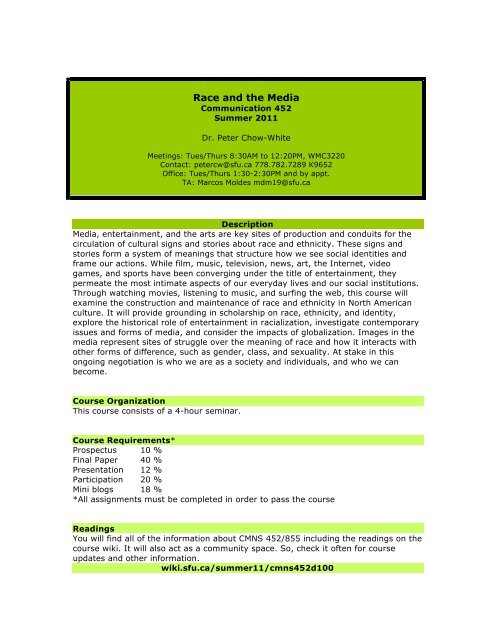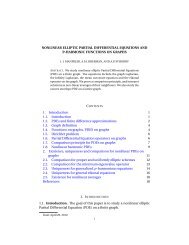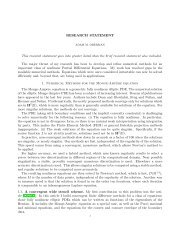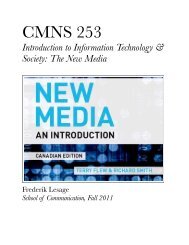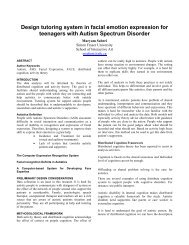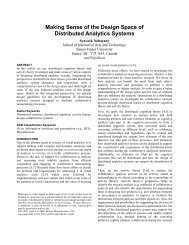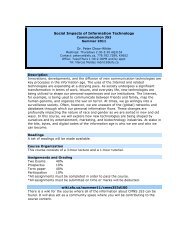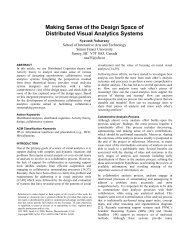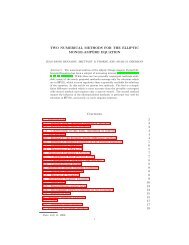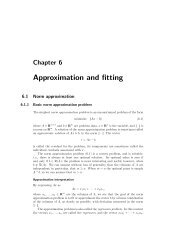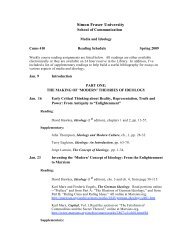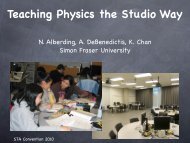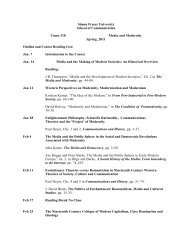CMNS 452 Su11 syllabus - SFU Wiki
CMNS 452 Su11 syllabus - SFU Wiki
CMNS 452 Su11 syllabus - SFU Wiki
Create successful ePaper yourself
Turn your PDF publications into a flip-book with our unique Google optimized e-Paper software.
Race and the Media<br />
Communication <strong>452</strong><br />
Summer 2011<br />
Dr. Peter Chow-White<br />
Meetings: Tues/Thurs 8:30AM to 12:20PM, WMC3220<br />
Contact: petercw@sfu.ca 778.782.7289 K9652<br />
Office: Tues/Thurs 1:30-2:30PM and by appt.<br />
TA: Marcos Moldes mdm19@sfu.ca<br />
Description<br />
Media, entertainment, and the arts are key sites of production and conduits for the<br />
circulation of cultural signs and stories about race and ethnicity. These signs and<br />
stories form a system of meanings that structure how we see social identities and<br />
frame our actions. While film, music, television, news, art, the Internet, video<br />
games, and sports have been converging under the title of entertainment, they<br />
permeate the most intimate aspects of our everyday lives and our social institutions.<br />
Through watching movies, listening to music, and surfing the web, this course will<br />
examine the construction and maintenance of race and ethnicity in North American<br />
culture. It will provide grounding in scholarship on race, ethnicity, and identity,<br />
explore the historical role of entertainment in racialization, investigate contemporary<br />
issues and forms of media, and consider the impacts of globalization. Images in the<br />
media represent sites of struggle over the meaning of race and how it interacts with<br />
other forms of difference, such as gender, class, and sexuality. At stake in this<br />
ongoing negotiation is who we are as a society and individuals, and who we can<br />
become.<br />
Course Organization<br />
This course consists of a 4-hour seminar.<br />
Course Requirements*<br />
Prospectus 10 %<br />
Final Paper 40 %<br />
Presentation 12 %<br />
Participation 20 %<br />
Mini blogs 18 %<br />
*All assignments must be completed in order to pass the course<br />
Readings<br />
You will find all of the information about <strong>CMNS</strong> <strong>452</strong>/855 including the readings on the<br />
course wiki. It will also act as a community space. So, check it often for course<br />
updates and other information.<br />
wiki.sfu.ca/summer11/cmns<strong>452</strong>d100
Attendance/Participation<br />
This course covers a lot of ground in thirteen weeks and we have a lot of work to do<br />
together. First off (and so important), attendance is mandatory. Making it to class<br />
(on time!) and being present for the discussions is a large part of being successful in<br />
this class. Second, group discussion is a central aspect of our daily class life, so<br />
please come prepared to talk about the readings and issues of the day. Being an<br />
upper level seminar, the expectation is that you will read all the readings for each<br />
week, and contribute meaningfully to the discussion. Class participation is worth<br />
20%.<br />
Mini Blog<br />
You will upload a “mini blog” (your summary of the article(s) in a few sentences) to<br />
the course wiki by midnight before class (see “readings” page in the wiki for mini<br />
blog links). The mini blogs are not graded but they are worth 18%/18 points of your<br />
final grade. You will receive 3 points if the post is on time, 1 point if it is late, and 0<br />
for missing a post. You do not have to make a post the class you are presenting (so,<br />
you do 6 out of 7 topics).<br />
For this course to be successful you need to be present in class, attentive and<br />
respectful of others, contribute to the discussion in a constructive and productive<br />
manner, and participate in the class wiki.<br />
Course Resource Pages<br />
There are a number of resources on the wiki on the “Course Documents” page. One<br />
of the fantastic advantages of a wiki is that everyone in the course can contribute<br />
and past classes have started to build bibliographic and other lists to share with each<br />
other and future students. We will continue to build on this community effort. You<br />
will be required to contribute to the resource pages as part of your participation<br />
grade. 5/10 of your participation grade will be based on your contribution to the<br />
“resource pages” on the wiki (which is 5% of your overall grade). Your contribution is<br />
due the same time as the final paper.<br />
Prospectus and Term Paper<br />
In addition to the mini blogs, writing for this course consists of two main parts: the<br />
paper prospectus and the term paper. The prospectus (no more than 3 pages, not<br />
including the references) is due at the beginning of class on Class 9 (June 7). In it,<br />
you will outline the topic and give a supporting rationale for choosing it. You will also<br />
include theoretical perspectives, empirical site of study, and potential secondary<br />
sources (bibliography). You are also required to include 1 or 2 guiding research<br />
questions and a working title. At this point, you should be in dialogue with Marcos<br />
and I about how to approach reading, researching, organizing, and writing about<br />
your topic. The prospectus is graded. The term paper (3000 words) is due at the<br />
end of the term (see the wiki for the date).<br />
Submission of the prospectus and term paper must be in both paper and electronic<br />
form. Submissions will not be considered complete until a hard copy and an<br />
electronic copy are received. Both assignments will be further outlined in class.<br />
Presentations<br />
Students will work in groups to prepare a short discussion/presentation at a seminar<br />
for one of the days of the course schedule. You will be assigned a set of readings<br />
from one of the day’s of the course and must formulate a set of questions that are<br />
engaging enough to ensure class discussion. You will also be required to draw on the<br />
media screened in the previous class and identify and utilize outside media artifacts
of popular culture (such as a film or television show) to ground your exploration of<br />
the theme of the week and the readings to prompt (or provoke) group discussion.<br />
The purpose of this assignment is to provide you with the opportunity to develop<br />
your critical reading skills, make formal presentations to the class and lead class<br />
discussion. Evaluation of your presentation is based on four elements:<br />
• Your thematic treatment of the issues and controversies from the collection of<br />
papers and/or chapters with interpretation, implications, context (including<br />
chronological context), conclusions (no annotated bibliographies!).<br />
• Your production and management of class discussion of provocative questions<br />
(see “Tip” below).<br />
• A ‘game/activity’ that involves the class (see “course resources” on the wiki).<br />
• Uploading your presentation materials to the course wiki. The instructions for<br />
the game/activity go in the “course resources” section.<br />
Tip: Try to avoid the question, “So what do you think” When using media, you need<br />
to set up the clip by unpacking the issues, theories, and/or concepts from the<br />
readings, introduce the clip, show the clip, and then debrief the clip and present one<br />
or two accessible and productive discussion questions that refer back to the specifics<br />
of the setup (such as the theory or concept).<br />
You may use powerpoint in your presentation, but it is not necessary. Someone must<br />
take notes during the discussions and record incorporate important points, issues,<br />
and controversies that arise in class. Include this report with your uploaded<br />
presentation to the wiki the evening of the class. You can go back and edit this, if<br />
necessary, but do have it up there by that evening.<br />
Deadlines<br />
Assignments are due on the date indicated. I will not grant extensions except in the<br />
direst of circumstances and under no circumstances will I grant an extension within<br />
24 hours of a due date. Missed deadlines will be assessed a deduction of one third of<br />
a letter grade per day (e.g. from A- to B+ for 1 day late). All assignments must be<br />
completed in order to pass the course.<br />
If the term does not go the way you planned (life does happen when we are not<br />
expecting it), don’t panic or hide. The best thing you can do is to talk to Marcos or I<br />
and keep us in the loop. Usually, we can work something out. It becomes very<br />
difficult to work anything out at or after a deadline.<br />
A word about laptops in class:<br />
I don't mind you bringing your laptop to class, as they can be productive for<br />
learning. Taking notes and finding relevant information, for example, are acceptable<br />
uses. However, they are not to be used as a distraction from the class. I especially<br />
will not tolerate surfing the web, checking facebook, etc. during presentations. You<br />
all will put a lot of time and effort into the presentations. Be respectful to your<br />
colleagues and yourself and give your full attention.
COURSE READING SCHEDULE*<br />
*See course wiki for full schedule, dates, and any possible revisions to the course content<br />
Class One – Course Introductions<br />
Class Two – Introduction to Race and Racism<br />
Screening: Race: the Power of an Illusion (PBS), Race: The History of an Idea (BBC),<br />
Classified X (Melvin Van Peeples)<br />
Class Three – Cultural Representation and Social Structures<br />
Reading: Omi and Winant, Bonnila-Silva, Kim<br />
Class Four – The Relations/Politics of Representing Race in the Media<br />
Reading: Hall, Freydberg, Jiwani, Entman & Rojecki<br />
Class Five - Hollywood and Stereotyping Asians and ‘Arabs’<br />
Film Screening: Kill Bill Vol. 1 (Tarantino)<br />
Reading: Said, Kawai, Tierney, Marchetti<br />
Class Six - Hollywood and Stereotyping Asians and ‘Arabs’<br />
Reading: Said, Kawai, Tierney, Marchetti<br />
Class Seven – Place and Race: Representing Los Angeles and Authenticity<br />
Film Screening: Crash (Haggis)<br />
Reading: Giroux, Klein, hooks<br />
Class Eight – Place and Race: Representing Los Angeles and Authenticity<br />
Reading: Giroux, Klein, hooks<br />
Class Nine – Producing an Oppositional Gaze, Telling Counter Stories<br />
Film Screening: Better Luck Tomorrow (Lin)<br />
Reading: Takaki, Hall, Chang, Yeo<br />
Class Ten – Producing an Oppositional Gaze, Telling Counter Stories<br />
Reading: Takaki, Hall, Chang, Yeo<br />
Class Eleven – From Rap to Hip Hop, from the Bronx to Global Phenomenon<br />
Reading: Chang, Lipsitz, Chang, Bennett, Christgau<br />
Class Twelve – New Media and New Possibilities for Representation<br />
Reading: Castells<br />
*Subject to change if necessary
Academic Integrity<br />
The School of Communication is committed to the highest standards of academic<br />
excellence and ethical support. The School expects that the grades in this course will<br />
bear some reasonable relation to established university-wide practices with respect<br />
to both levels and distributions of grades. The School follows Policy T10.02 with<br />
respect to “Intellectual Honesty” and “Academic Discipline” (See <strong>SFU</strong> Calendar,<br />
General Regulations). These policies, procedures and guidelines will be assiduously<br />
upheld. They protect your rights, as well as those of the faculty.<br />
It is particularly important that you be aware of and avoid plagiarism, cheating on<br />
exams, submitting a paper to more than one professor, or submitting a paper<br />
authored by anyone other than yourself. Violations of this policy will result in a<br />
failing grade in the course, and be reported to the proper university office. If you<br />
have any doubts about any of these practices, you must confer with the professor or<br />
the teaching assistant.<br />
Disability<br />
Any students requesting academic accommodations based on a disability are<br />
required to contact the Centre for Students with Disabilities. For exam and other<br />
accommodations, students are responsible for contacting the Disabilities Services<br />
Officer to arrange their specific exam accommodations at the start of the semester.<br />
Then, prior to each exam, students are required to take an Examination Request<br />
Form to their instructor. http://www.sfu.ca/csd or 778-782-3112.


